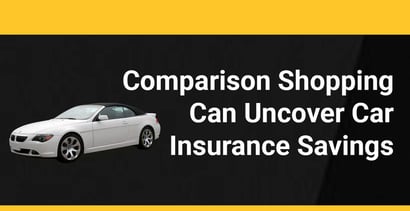
In a Nutshell: The world of car insurance can seem convoluted to the uninitiated. Comparison shopping allows drivers to gain a more in-depth understanding of car insurance policies. Consumers who practice comparison shopping can unearth opportunities to save on their policies. Bundling insurance plans can also save consumers money, though bundles can decrease in value over time.
Individuals who don’t own a car sidestep the hassles of car ownership, including the expenses associated with maintaining a vehicle. But car ownership also provides consumers with benefits.
People who own a car may have access to more job opportunities than those who don’t. Car owners also have the freedom to hit the road at their leisure without being bound to the availability of public transportation or having to walk to get from one point to another.
Most states require drivers to have car insurance to operate their vehicles legally. Car insurance can be expensive, but car owners can minimize their exposure to costly insurance by comparison shopping.

We spoke with Stefano Mazzotta, a Professor of Economics, Finance, and Quantitative Analysis at Kennesaw State University in Kennesaw, Georgia, to learn more about how comparison shopping for car insurance can benefit drivers. Mazzotta said he is particularly interested in topics related to consumer credit.
Comparison shopping can help consumers in the market for car insurance understand the different types of insurance companies offer. Consumers can use the information they uncover through comparison shopping to determine which insurance factors are most important to them.
It’s easier for consumers to compare coverage from different insurance companies when carriers disclose detailed information about the plans they offer. But Mazzotta said comparing car insurance can be challenging because the terms and options of different coverage are difficult to interpret.
Before setting out to comparison shop, consumers should familiarize themselves with the terminology common to the industry. Mazzotta said some insurance companies disclose information about their coverage that doesn’t help consumers evaluate the cost of insurance.
“There are certain practices in the industry that aim for transparency, but generally, firms aren’t particularly interested in transparency,” Mazzotta said. “Therefore, they find a way to get consumers interested in their product without entirely disclosing the consequences, which can make comparison shopping less meaningful from the consumer’s perspective.”
An Insurance Carrier’s Reputation is Worth Noting
Another challenge to comparison shopping for car insurance is that coverage contains a multitude of elements. Consumers comparing different brands of walking shoes are likely to have a few attributes they seek in footwear. They may be able to conduct a comprehensive review of shoe options quickly, but car insurance plans often contain a plethora of details that people outside the insurance industry may struggle to understand.
Mazzotta said that although most consumers aren’t experts in car insurance, comparing insurance options is a necessary task they should perform to the best of their ability. He said comparison shoppers should take into account the underwriter’s reputation. Some underwriters may pay customers for covered incidents without subjecting them to intense scrutiny.

“Insurance businesses generally make money all along until a claim is submitted,” Mazzotta said. “That’s when you discover the quality of your policy. And some carriers can make life miserable for consumers who submit claims. The ease of the process, coupled with receiving fair compensation for an event that is insured, are equally important, in my opinion.”
Consumers following a strict budget may be inclined to enroll in the most inexpensive car insurance option they can find. Consumers who spend less on car insurance may reason they can use the money they save on car insurance for other expenses. But those with inexpensive car insurance may pay more than consumers with costlier plans if they are involved in an auto accident requiring them to submit a claim to their insurance carrier.
Mazzotta said consumers need to exercise care when shopping for car insurance to ensure they are getting sufficient coverage. He said consumers need to weigh the risks involved in purchasing inexpensive insurance options and recognize the balancing act between the risks they can afford not to cover and those they can transfer to an insurer.
Bundles May Complicate Insurance Comparisons
Many insurance carriers offer consumers coverage terms of six months. The relatively short length of car insurance policies can allow consumers to practice comparison shopping on a regular basis.
Coverage options can change over time, so it’s essential that drivers regularly review their insurance to take note of any components that have changed or that their carrier no longer offers. Mazzotta said consumers should shop for car insurance each time they receive a renewal letter from their carrier.

“Shopping around is important near the time of a policy’s renewal because that’s when you have the attention of your broker, and you might be able to get better conditions by speaking with your insurance agent,” Mazzotta said. “Bundling multiple insurance needs with one provider can further complicate comparison shopping. If you bundle your home, auto, and any other types of insurance you have, then you need to review all your plans at once, and that isn’t an easy task.”
Although bundling insurance may provide consumers with a more favorable price when they initially enroll in a bundle plan, the bundle’s value may erode over time as insurance prices increase.
An insurer’s reluctance to provide quotes for car insurance plans that directly align with a consumer’s current coverage can hinder the effectiveness of comparison shopping. Mazzotta said that just because comparison shopping can be cumbersome doesn’t mean consumers shouldn’t push their insurance agents to research ways to access savings or insurance features that are more beneficial to their driving practices.
For example, drivers who drive fewer miles per day than they did when they first enrolled in their car insurance plan may be able to obtain less expensive rates for an upcoming policy.
Improved Credit Can Open Doors to Favorable Rates
Some car insurance carriers try to entice new customers by offering them unique insurance plans, such as those that allow consumers to pay fees for their car insurance based on how many miles they drive.
Mazzotta said he advises consumers to exercise caution when considering pay-per-mile insurance policies because they may come with strings attached. He said drivers may have to agree to allow their insurer to share their information with other entities to receive discounted rates.

Consumers with good credit scores can access more favorable rates on lending products and may appear more trustworthy to potential employers. They may also receive more offers for car insurance than consumers with bad credit. Mazzotta said consumers may have bad credit due to factors unrelated to their financial management practices. He said bad credit can also stem from issues beyond a consumer’s control.
“Someone may have bad credit simply because they are new to credit,” Mazzotta said. “Or their bad credit may be related to their lack of owning multiple bank accounts, or it could be because they were involved in an accident. Bad credit can be the result of an accumulation of poor financial decisions, but there are a number of reasons why people have bad credit even though they don’t deserve to.”
Regardless of a consumer’s credit standing, comparison shopping can benefit them. Even if comparison shopping doesn’t lead a driver to find a deal on car insurance they weren’t previously aware of, it can educate them about a product and industry that are continually evolving.





